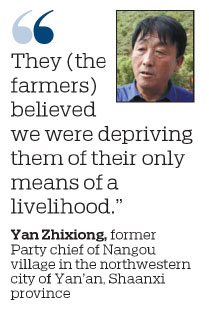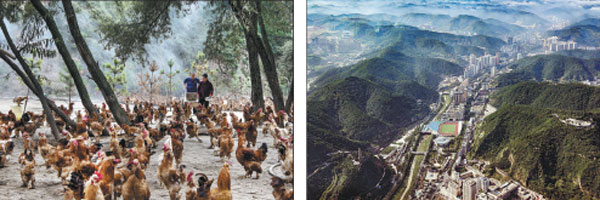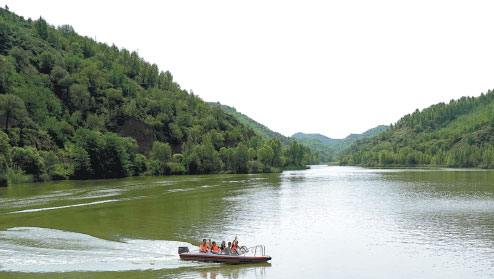Burying the past, to plant a greener vision of the future
Once semi-barren hills have been regenerated by getting farmers to go green. Li Lei and Huo Yan report from Yan'an, Shaanxi province.
By 1998, the mountain village of Nangou in the northwestern city of Yan'an, Shaanxi province, was on the brink of environmental collapse. Decades of intensive farming and overgrazing had stripped the village of nearly all its vegetation, worsening the naturally semi-barren landscape.
In summer, frequent flash floods posed great risks to both villagers and crops in the ravine, while raging sandstorms during the rest of the year led to poor crop yields.
To stop the degradation, authorities in Wuqi county, which oversees the mountain hamlet, decided to persuade villagers to give up farming on the hillsides and instead plant walnut and apricot trees.
When mature, the cash crops would offer farmers a more stable basic income. The trees' root systems would also help protect the loose dirt on the hillsides from water erosion.
At the time, China had yet to launch its landmark reforestation program aimed at phasing out farming and grazing practices in environmentally fragile regions by offering subsidies to farmers.
Without the reassurance of compensation, farmers who had tilled the soil for years in the mountain village questioned the plan. They feared that if it failed there would be a food crisis.
"They believed we were depriving them of their only means of a livelihood," said Yan Zhixiong, former Party chief of the village.
The same suspicions prevailed among officials at the county and village levels. Many warned that failure of the program could threaten the livelihoods of hundreds of thousands of rural people.
"What did we do then? We did the math," Yan said, referring to their attempts to convince farmers, as well as themselves, that switching to cash crops would make farmers better off and generate immense environmental benefits.
The reforestation effort in Wuqi that began in 1998 was China's earliest government-led attempt to limit farming's damage to fragile environments.
One year later, following a symbolic visit by Premier Zhu Rongji to Yan'an, the small county's initial trial morphed into a nationwide campaign to return degraded farmlands and pastures to a healthier state.
Under the policy, the central government offered free saplings to farmers, who were required to progressively give up farming or grazing on hillside areas. As an incentive, they were provided with grain that exceeded the yield of their land. This later became monetary allowances calculated by land area.
Figures provided by the local government show Wuqi county has phased out farming on 163,000 hectares of land over the past two decades, and more than 2.1 billion yuan ($293 million) has been handed over to complying farmers.
Fear of failure
Despite the drastic decline in the area of farmland, the county's grain output has not dropped as feared.
Liu Guangliang, deputy director of the county's forestry bureau, said farmers used to plant extensively, but harvests were poor due to water and soil erosion, limited vegetation and uneven rainfall.
Now, having less land to farm has forced villagers to improve their yield from the land.
"Less land meant farmers had to embrace much more intensive farming practices, and adopt modern agriculture technologies," Liu said. "The improved forest coverage also contributed to the hike in grain output."
Yan'an, sitting on the Loess Plateau in the north of Shaanxi, is among the country's most environmentally fragile regions with its bare hills, winding ravines and swirling dust. It has been depicted in a number of artistic works, including the 1987 film Old Well, which stars the Beijing Olympics opening ceremony director Zhang Yimou, and has a plot involving a water-starved village.
Yan'an's rainfall - 500 millimeters a year - is usually from June to September. When the rain comes, it easily washes away the thin layer of top soil.
For decades, the muddy sediment was discharged into the upper and middle reaches of the Yellow River, and raised the risk of it bursting its banks in populous central provinces.
Experts say the region's environmental degradation was largely an outcome of intense human activity dating to the 1940s, when Chinese communists drove the cultivation of wilderness areas to ensure the survival of the revolution in Yan'an, an underdeveloped region besieged by the Kuomintang.
Intensive and widespread farming was required to feed humans and livestock, and crop residue was used as firewood. The trend continued after the founding of the People's Republic of China in 1949, which kick-started the rapid population explosion in cities and greater demand for land.
Hou Xiuzhen, whose father-in-law Liu Baozhai was among Red Army commanders who led Yan'an's cultivation boom in the 1940s, said her ancestors had turned the city's Nanniwan village into a crucial supply area for revolutionaries, albeit at a heavy cost to the environment.
"Rains in summer used to cause flash floods that destroyed paddy fields in the ravines, and in some cases killed people," she said.
Pretty green
Yan'an had tried to turn the over-plowed farmland into forests before the 1999 nationwide program started, but with little success.
Saplings provided for planting by local authorities were either removed by farmers seeking to expand their land holdings or eaten by hungry goats wandering the hills in search of food.
The ambitious new reforestation program had two major goals - to stop the land degradation and restructure rural industry.
It was also intended to boost rural incomes and navigate farmers away from unsustainable practices.
Many villagers were encouraged to plant trees that could make cash, such as apple and apricot trees, but commercial plantations could not exceed one-fifth of the total reforested area.
With grazing banned on hills, local governments also funded projects to raise livestock indoors or grow vegetables in greenhouses.
By the end of last year, the municipal government in Yan'an said it had reforested more than 718,000 hectares once used for farming, about 2.1 percent of the national total of reforested land and 27 percent of the province's total.
Wang Binqiang, a farmer in Yan'an who has relinquished about 2 hectares of land over the past two decades, said his family of five once earned a meager income from corn, soybean and millet. In 2010, with government assistance, the reforestation campaign forced him to plant apple trees.

"As the trees begin to bear fruit, the income soared," 45-year-old Wang said. "I've earned 70,000 yuan this year, and I expect the number to top 200,000 yuan next year."
Yang Shuwei, head of Fengzhuang village in Yan'an's northern suburbs, said the reforestation campaign, now in its 20th year, had revolutionized locals' approach to farming.
In Wuqi county, reforestation has freed farmers from toiling on low-yield land, enabling them to work in cities and earn a higher income.
With an improved environment, Nangou village has become a scenic area with lush mountains, a vast lake and a cave hotel modeled after local folk houses.
After retiring as the village Party chief last year, Yan Zhixiong established a tourism cooperative with his fellow farmers. He said they earned 1 million yuan in revenue in less than a year.
"We are planning to expand the parking lot and improve the catering service so as to attract more visitors," he said, adding they hired locals who did not have to travel far for work.
Despite the program's progress, Hao Yunfeng, deputy director of the city's Yichuan county, noted that the reforested areas are not pristine forests. He said they lacked biodiversity, were not ecologically robust and could not support a complicated ecosystem.
Asked how long it would take to restore the area's full ecological capacity, he seemed uncertain. "It may take 50 years, a century or even longer," he said.
Contact the writers at lilei@chinadaily.com.cn
|
From left: Zhang Lianlian and her husband feed their chickens by the forest in Yan'an, Shaanxi province, on Aug 27. They have planted more than 200,000 trees in the past 37 years; an aerial view of Baota Mountain shows the reforestation in Yan'an.Tao Ming/xinhua |
|
A boat crosses the lake in Nangou village, Yan'an, Shaanxi province, now a scenic area featuring lush mountains, a vast lake and a cave hotel modeled from local folk houses.Huo Yan / China Daily |
(China Daily Global 09/04/2019 page5)




















